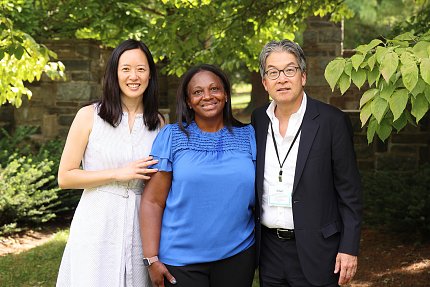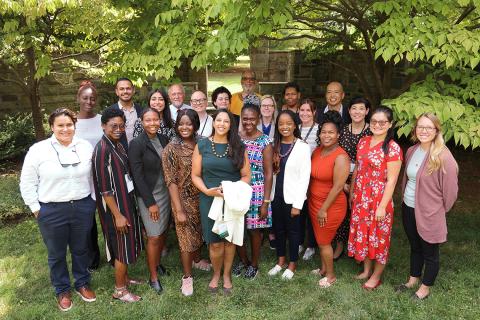How to LAUNCH a Global Health Research Career

Photo: Chia-Chi Charlie Chang
Each year the faces change, though the contagious enthusiasm remains the same. In July, the Fogarty International Center (FIC) brought trainees from across the globe to NIH’s Bethesda campus for its annual, week-long orientation program.
Each early-career researcher, selected for Fogarty’s Launching Future Leaders in Global Health (LAUNCH) Research Training Program, will embark on a one-year mentored research project at a research institution or project site in a low- and middle-income country (LMIC). Trainees include predoctoral fellows and scholars from the U.S. as well as postdoctoral fellows and scholars from both LMICs and the U.S.
The orientation featured lectures, workshops, classes and informal talks, providing an overview of the year ahead as a Fogarty trainee and member of a research team. Session topics focused on a range of topics, including global health ethics, collaboration best practices, decision-making, project management, community engagement, safety, time management, policy impact, as well as advice for an ongoing career. The orientation also provides networking opportunities for fellows, including an optional morning run with Dr. Craig R. Cohen, professor at the University of California, San Francisco.
LAUNCH structure
Cohen is director of the GloCal Consortium, one of seven total LAUNCH consortia, each with its own unique program and application process. LAUNCH builds on successes and experiences of past programs (all informally referred to as the “Fogarty Fellows and Scholars program”).

Photo: Chia-Chi Charlie Chang
In little more than 20 years, LAUNCH—a recently adopted name that better reflects the program’s intentions—has grown from a scant 35 scholars at 14 research institutions per year to supporting more than 100 scholars at over 60 research institutions and sites each year. Now in its fifth cycle, the program maintains the consortia structure, with a focus on training predominantly postdoctoral fellows from the U.S. and LMICs plus U.S. predoctoral students.
Among 2024 orientation’s standout features was a comprehensive discussion of global health research by Dr. Joia Mukherjee, associate professor and director of the master of medical sciences in global health delivery at Harvard Medical School. Mukherjee stated that inequity is lethal, given that social forces, such as classism and racism, have both magnitude and direction. Health equity, then, is essentially remediation. Equity, as defined by Mukherjee, is overcoming those factors that infringe on fairness so that all people have access to the resources for remaining healthy or achieving positive well-being.
“This is not charity; this is retrospective justice,” she said, noting the need to identify past wrongs and remedy them.
Building health care infrastructure
The legacy of colonialism translates to some countries having less than $5 per capita for health, explained Mukherjee. At best, this small amount of money pays for GOBI administered by volunteers. “GOBI” (which stands for Growth monitoring; Oral rehydration therapy for diarrhea management; Breastfeeding promotion; and Immunization) represents the World Health Organization’s primary care initiatives. She concluded that the only way to turn the tide on global health is by shifting cashflows toward training physicians and nurses, while building healthcare infrastructure, including systems and social support.
Photo: Chia-Chi Charlie Chang
New this year was a workshop focused on pitching to media facilitated by the Fogarty communication’s team, and Dayna Kerecman Myers, managing editor of Global Health Now, a publication of Johns Hopkins Bloomberg School of Public Health. The workshop allowed trainees to assemble into small groups to exchange ideas and pitch their research stories to Myers, who gave constructive feedback.
One of the most moving pitches came from a Peruvian fellow, whose project deals with communication issues between health care providers and patients in rural areas of the Amazon; his pitch included the example of a man who unknowingly lived with HIV for more than a year because doctors could not reach him.
While Fogarty’s orientation program has changed over the years, the fundamental driving force persists: to inspire early-career researchers. In total, more than 1,300 pre- and postdoctoral trainees and other health-related professional participants have conducted research through this trainee program, resulting in more than 2,400 peer-review publications in a variety of infectious and non-communicable disease areas. Fogarty has not only launched the careers of hundreds of researchers, but also supported health and biomedical research with far-reaching applications.
For more information about Fogarty’s Global Health Program for fellows and scholars, see: https://go.nih.gov/sgVrndf.
